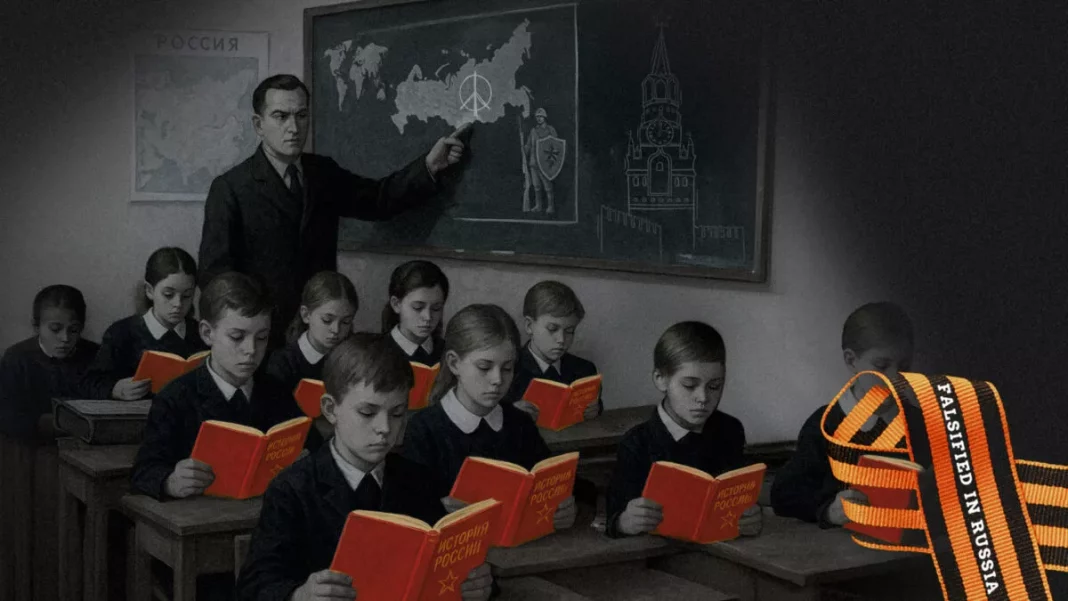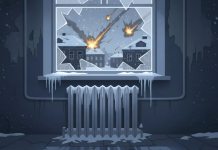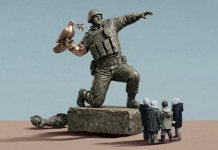By EUvsDisinfo
The Kremlin’s information manipulation and influence operations are not always immediately devious. Sometimes Moscow takes a ‘softer touch’. In our previous articles we have uncovered how the Kremlin wields this soft power to expand Russia’s influence. We have explored Rossotrudnichestvo, an influence operation disguised as cultural cooperation. We have also looked at the Kremlin’s broader strategy of employing historical revisionism , including in our articles on Manipulating Memory: Rewriting School History Books and Back to school in Russia – more revision of history, to justify Russian present-day imperialism.
This article will continue the exploration of how Russia leverages education to shape perceptions and extend its influence beyond traditional power structures.
Russia, we are told, never starts wars – it only finishes them. This patriotic meme, born out of Vladimir Putin’s comment on the war in Ukraine, is now being drilled into the minds of Russian high school students with the help of newly revised history textbooks, co-authored by the rector of the Moscow State Institute of International Relations (MGIMO) Anatoly Torkunov and Vladimir Medinsky, former Minister of Culture turned full-time Putin-surrogate and disinformation mouthpiece beside heading the Russian team in the negotiations with Ukraine on ceasefires and prisoner exchange among others.
Task: Re-programme the youth
As Putin’s official aide and head of the Russian Military Historical Society, Medinsky is the architect of a campaign to rework Russia’s military past into a patriotic fairytale of Russia as the eternal victim, the noble defender, and the reluctant warrior. The new textbooks are part of this campaign of historical revisionism designed not just to sanitise the past, but to justify the present and prepare for future wars.
Always on the defensive
The new history textbooks for grades 10 and 11, published by the start of the school year 2023, are now part of the standard curriculum in Russia. In these books, Russia never acts out of imperial ambition or greed. Instead, every war becomes a tragic necessity. World War I is portrayed as a conflict that Russia only reluctantly joined to “protect its national interests and oppose German expansion” – the fact that Russia had its own imperial ambitions, like dominance in the Balkans, is completely ignored.

World War II, or the Great Patriotic War 1941-1945, as it is known in Russia, seems even harder to fit into that narrative. But the authors unflinchingly tell the tale of how the USSR was forced into difficult decisions. The Molotov-Ribbentrop pact, which facilitated the joint Nazi-Soviet carve-up of Eastern Europe, is reframed as nothing more than a clever diplomatic move to buy time and prepare for Hitler’s inevitable betrayal.
This is a 180-degree turn away from the decision of December 1989, when the Soviet Congress of People’s Deputies condemned the Pact and agreements in a formal resolution.

On to the 1990ies
The two brutal wars that the Russian military waged in Chechnya in the 1990s and 2000s are whitewashed as a fight against “terrorist gangs”. Reflections about national aspirations of self-determination of the ethnic groups are dismissed, there’s no mention of discussions about human rights abuses or air raids, and military action is euphemistically referred to as “overcoming a crisis” to preserve “territorial unity”.

Invading to “protect”
Whenever Russia acts first, it is cast as a benevolent protector. The Soviet occupation of Eastern Poland and the Baltic states in 1939-1940 is rebranded as “liberation”, with Moscow taking its neighbours “under protection” in turbulent times. The Poles “greeted the Soviet army as liberators”, the book claims. A 1939 propaganda poster included on the previous page exclaims: “Extending a helping hand to brotherly nations of Western Ukraine and Western Belarus is our sacred duty!”
This rhetoric reappears in the description of the 2008 war against Georgia over South Ossetia, with a slight twist – this time, instead of the brotherly Slavic nations, Russia is “protecting the Russian-speaking population”. The same argument is used to explain the illegal annexation of Crimea and the armed intervention in the Donbas region of Ukraine in 2014: again, the textbooks cite the need to shield Russian speakers from harm – whether real, imagined or manufactured.

This pattern goes back decades, even centuries. Russian leaders have long cloaked expansionism in lofty rhetoric. From the conquest of Central Asia in the 19th century to the annexation of Crimea in the 21st, the justification is always the same: Russia has a sacred duty to “civilize,” “liberate,” or “defend.”
The logic is familiar to the colonialist “civilizing missions” of former European empires, only now it comes wrapped in 21st-century Kremlin propaganda.
Heroism over complexity
Russia’s military effectiveness is inflated throughout the books. Even though the new Bolshevik government of Soviet Russia exited World War I in early 1918, well before the German defeat in late 1918, the Russian army is credited with having a “major contribution in the defeat of enemy armies”.
In the chapters on World War II, the Western allies’ contributions are minimized. The darker pages of the Red Army’s history, from the plunder of Eastern Europe to the use of penal battalions, are now beyond discussion. In fact, Russian law now makes it a criminal offense to criticize the Red Army’s conduct during World War II. It’s officially considered contributing to “rehabilitation of Nazism.”
Under the regime that views history as an instrument, it’s no wonder that foreign intelligence chief Sergei Naryshkin also chairs the Russian Historical Society, and dissenting views are systematically pushed out of public discourse.
Textbooks for war
What’s happening here goes far beyond bad education. These textbooks are ideological training manuals for manufacturing loyalty and suppressing dissent. They prepare Russian children and youth to see war not as a tragic failure of politics, but as a sacred and necessary act of national self-defense. In a country where history is being rewritten at the highest levels of government, militarism isn’t just tolerated, it’s canonized. The society engineering, or call it indoctrination, does have an effect: recent polls report that Russian youth tend to be more pro-war than in the years before and overall more supportive then older generations.
Close the archives
Unlike most democratic societies, where time brings debate, disclosure, and reckoning with uncomfortable truths, Russia is closing the historical record. Archives which were opened during the 1990ies are closed while other remain sealed.
Alternative perspectives are criminalized. And in their place, a rigid, black-and-white narrative is being erected — one that positions Russia as a nation that has never attacked, never occupied, and never committed atrocities.
By convincing a generation that Russia is always on the right side of history, the state ensures that any future aggression, no matter how brutal or unprovoked, will be greeted not with doubt, but with patriotic fervor.
In the next article, we’ll look at how the new high school textbooks promote the idea of the West as the Eternal Enemy – and how the myth of Western Betrayal is taught as historical fact.
By EUvsDisinfo





